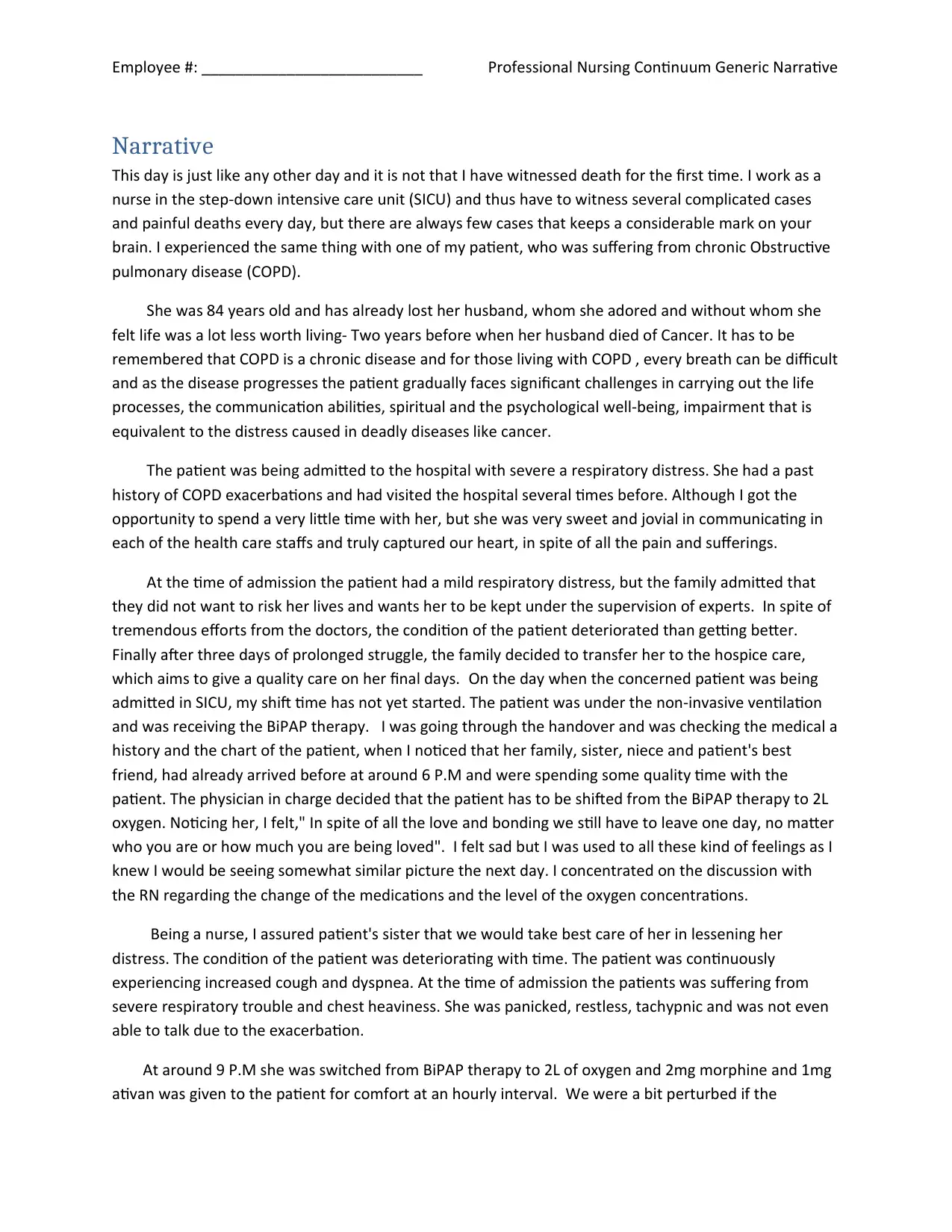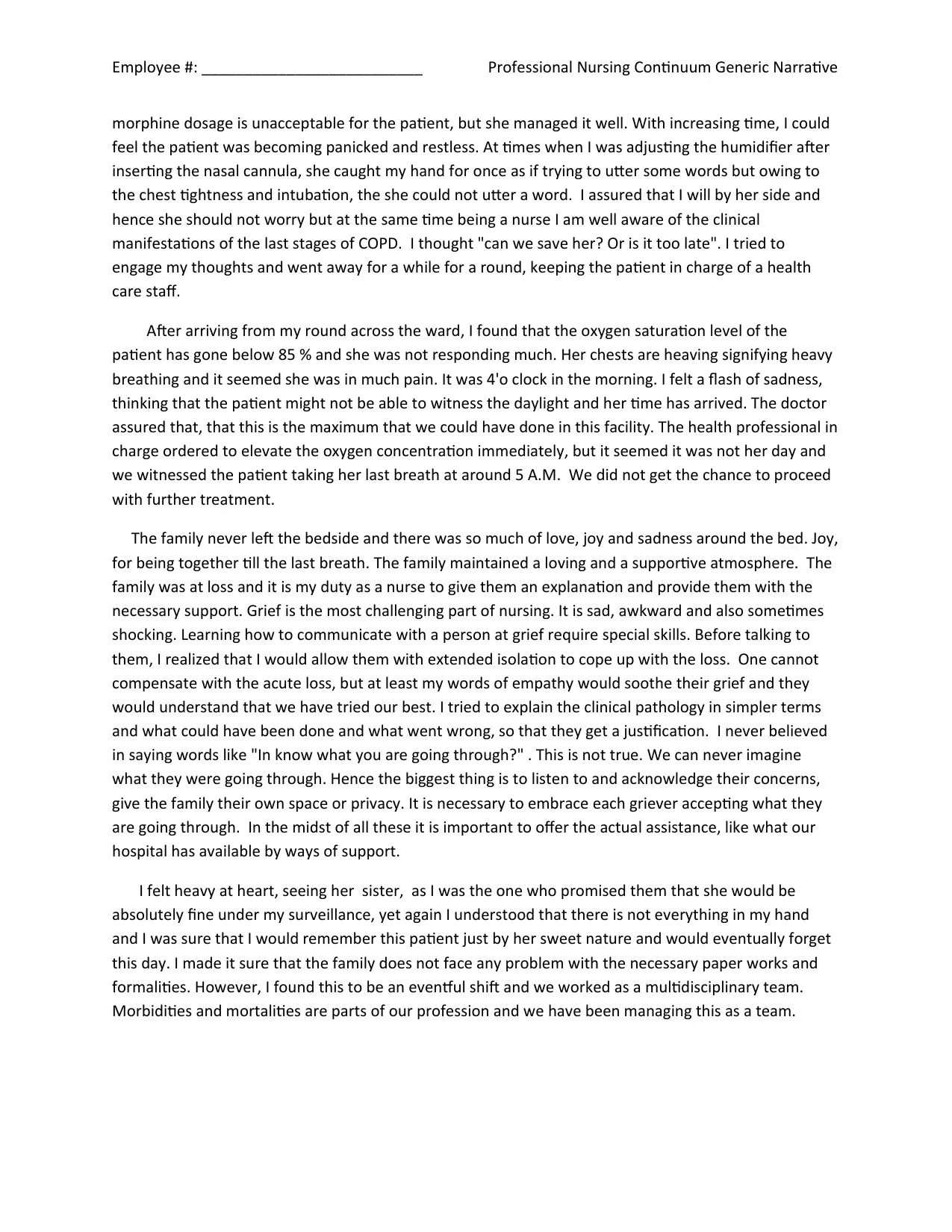Professional Nursing Continuum Generic Narrative
VerifiedAdded on 2023/06/10
|3
|1386
|301
AI Summary
A nurse shares their experience with a patient suffering from COPD in the SICU and how the patient's family coped with the loss. The patient was admitted with respiratory distress and despite efforts from the doctors, her condition deteriorated. The family decided to transfer her to hospice care and the patient passed away after three days of struggle. The nurse reflects on the experience and shares how they provided support to the family.
Contribute Materials
Your contribution can guide someone’s learning journey. Share your
documents today.

Employee #: __________________________ Professional Nursing Continuum Generic Narrative
Narrative
This day is just like any other day and it is not that I have witnessed death for the first time. I work as a
nurse in the step-down intensive care unit (SICU) and thus have to witness several complicated cases
and painful deaths every day, but there are always few cases that keeps a considerable mark on your
brain. I experienced the same thing with one of my patient, who was suffering from chronic Obstructive
pulmonary disease (COPD).
She was 84 years old and has already lost her husband, whom she adored and without whom she
felt life was a lot less worth living- Two years before when her husband died of Cancer. It has to be
remembered that COPD is a chronic disease and for those living with COPD , every breath can be difficult
and as the disease progresses the patient gradually faces significant challenges in carrying out the life
processes, the communication abilities, spiritual and the psychological well-being, impairment that is
equivalent to the distress caused in deadly diseases like cancer.
The patient was being admitted to the hospital with severe a respiratory distress. She had a past
history of COPD exacerbations and had visited the hospital several times before. Although I got the
opportunity to spend a very little time with her, but she was very sweet and jovial in communicating in
each of the health care staffs and truly captured our heart, in spite of all the pain and sufferings.
At the time of admission the patient had a mild respiratory distress, but the family admitted that
they did not want to risk her lives and wants her to be kept under the supervision of experts. In spite of
tremendous efforts from the doctors, the condition of the patient deteriorated than getting better.
Finally after three days of prolonged struggle, the family decided to transfer her to the hospice care,
which aims to give a quality care on her final days. On the day when the concerned patient was being
admitted in SICU, my shift time has not yet started. The patient was under the non-invasive ventilation
and was receiving the BiPAP therapy. I was going through the handover and was checking the medical a
history and the chart of the patient, when I noticed that her family, sister, niece and patient's best
friend, had already arrived before at around 6 P.M and were spending some quality time with the
patient. The physician in charge decided that the patient has to be shifted from the BiPAP therapy to 2L
oxygen. Noticing her, I felt," In spite of all the love and bonding we still have to leave one day, no matter
who you are or how much you are being loved". I felt sad but I was used to all these kind of feelings as I
knew I would be seeing somewhat similar picture the next day. I concentrated on the discussion with
the RN regarding the change of the medications and the level of the oxygen concentrations.
Being a nurse, I assured patient's sister that we would take best care of her in lessening her
distress. The condition of the patient was deteriorating with time. The patient was continuously
experiencing increased cough and dyspnea. At the time of admission the patients was suffering from
severe respiratory trouble and chest heaviness. She was panicked, restless, tachypnic and was not even
able to talk due to the exacerbation.
At around 9 P.M she was switched from BiPAP therapy to 2L of oxygen and 2mg morphine and 1mg
ativan was given to the patient for comfort at an hourly interval. We were a bit perturbed if the
Narrative
This day is just like any other day and it is not that I have witnessed death for the first time. I work as a
nurse in the step-down intensive care unit (SICU) and thus have to witness several complicated cases
and painful deaths every day, but there are always few cases that keeps a considerable mark on your
brain. I experienced the same thing with one of my patient, who was suffering from chronic Obstructive
pulmonary disease (COPD).
She was 84 years old and has already lost her husband, whom she adored and without whom she
felt life was a lot less worth living- Two years before when her husband died of Cancer. It has to be
remembered that COPD is a chronic disease and for those living with COPD , every breath can be difficult
and as the disease progresses the patient gradually faces significant challenges in carrying out the life
processes, the communication abilities, spiritual and the psychological well-being, impairment that is
equivalent to the distress caused in deadly diseases like cancer.
The patient was being admitted to the hospital with severe a respiratory distress. She had a past
history of COPD exacerbations and had visited the hospital several times before. Although I got the
opportunity to spend a very little time with her, but she was very sweet and jovial in communicating in
each of the health care staffs and truly captured our heart, in spite of all the pain and sufferings.
At the time of admission the patient had a mild respiratory distress, but the family admitted that
they did not want to risk her lives and wants her to be kept under the supervision of experts. In spite of
tremendous efforts from the doctors, the condition of the patient deteriorated than getting better.
Finally after three days of prolonged struggle, the family decided to transfer her to the hospice care,
which aims to give a quality care on her final days. On the day when the concerned patient was being
admitted in SICU, my shift time has not yet started. The patient was under the non-invasive ventilation
and was receiving the BiPAP therapy. I was going through the handover and was checking the medical a
history and the chart of the patient, when I noticed that her family, sister, niece and patient's best
friend, had already arrived before at around 6 P.M and were spending some quality time with the
patient. The physician in charge decided that the patient has to be shifted from the BiPAP therapy to 2L
oxygen. Noticing her, I felt," In spite of all the love and bonding we still have to leave one day, no matter
who you are or how much you are being loved". I felt sad but I was used to all these kind of feelings as I
knew I would be seeing somewhat similar picture the next day. I concentrated on the discussion with
the RN regarding the change of the medications and the level of the oxygen concentrations.
Being a nurse, I assured patient's sister that we would take best care of her in lessening her
distress. The condition of the patient was deteriorating with time. The patient was continuously
experiencing increased cough and dyspnea. At the time of admission the patients was suffering from
severe respiratory trouble and chest heaviness. She was panicked, restless, tachypnic and was not even
able to talk due to the exacerbation.
At around 9 P.M she was switched from BiPAP therapy to 2L of oxygen and 2mg morphine and 1mg
ativan was given to the patient for comfort at an hourly interval. We were a bit perturbed if the
Secure Best Marks with AI Grader
Need help grading? Try our AI Grader for instant feedback on your assignments.

Employee #: __________________________ Professional Nursing Continuum Generic Narrative
morphine dosage is unacceptable for the patient, but she managed it well. With increasing time, I could
feel the patient was becoming panicked and restless. At times when I was adjusting the humidifier after
inserting the nasal cannula, she caught my hand for once as if trying to utter some words but owing to
the chest tightness and intubation, the she could not utter a word. I assured that I will by her side and
hence she should not worry but at the same time being a nurse I am well aware of the clinical
manifestations of the last stages of COPD. I thought "can we save her? Or is it too late". I tried to
engage my thoughts and went away for a while for a round, keeping the patient in charge of a health
care staff.
After arriving from my round across the ward, I found that the oxygen saturation level of the
patient has gone below 85 % and she was not responding much. Her chests are heaving signifying heavy
breathing and it seemed she was in much pain. It was 4'o clock in the morning. I felt a flash of sadness,
thinking that the patient might not be able to witness the daylight and her time has arrived. The doctor
assured that, that this is the maximum that we could have done in this facility. The health professional in
charge ordered to elevate the oxygen concentration immediately, but it seemed it was not her day and
we witnessed the patient taking her last breath at around 5 A.M. We did not get the chance to proceed
with further treatment.
The family never left the bedside and there was so much of love, joy and sadness around the bed. Joy,
for being together till the last breath. The family maintained a loving and a supportive atmosphere. The
family was at loss and it is my duty as a nurse to give them an explanation and provide them with the
necessary support. Grief is the most challenging part of nursing. It is sad, awkward and also sometimes
shocking. Learning how to communicate with a person at grief require special skills. Before talking to
them, I realized that I would allow them with extended isolation to cope up with the loss. One cannot
compensate with the acute loss, but at least my words of empathy would soothe their grief and they
would understand that we have tried our best. I tried to explain the clinical pathology in simpler terms
and what could have been done and what went wrong, so that they get a justification. I never believed
in saying words like "In know what you are going through?" . This is not true. We can never imagine
what they were going through. Hence the biggest thing is to listen to and acknowledge their concerns,
give the family their own space or privacy. It is necessary to embrace each griever accepting what they
are going through. In the midst of all these it is important to offer the actual assistance, like what our
hospital has available by ways of support.
I felt heavy at heart, seeing her sister, as I was the one who promised them that she would be
absolutely fine under my surveillance, yet again I understood that there is not everything in my hand
and I was sure that I would remember this patient just by her sweet nature and would eventually forget
this day. I made it sure that the family does not face any problem with the necessary paper works and
formalities. However, I found this to be an eventful shift and we worked as a multidisciplinary team.
Morbidities and mortalities are parts of our profession and we have been managing this as a team.
morphine dosage is unacceptable for the patient, but she managed it well. With increasing time, I could
feel the patient was becoming panicked and restless. At times when I was adjusting the humidifier after
inserting the nasal cannula, she caught my hand for once as if trying to utter some words but owing to
the chest tightness and intubation, the she could not utter a word. I assured that I will by her side and
hence she should not worry but at the same time being a nurse I am well aware of the clinical
manifestations of the last stages of COPD. I thought "can we save her? Or is it too late". I tried to
engage my thoughts and went away for a while for a round, keeping the patient in charge of a health
care staff.
After arriving from my round across the ward, I found that the oxygen saturation level of the
patient has gone below 85 % and she was not responding much. Her chests are heaving signifying heavy
breathing and it seemed she was in much pain. It was 4'o clock in the morning. I felt a flash of sadness,
thinking that the patient might not be able to witness the daylight and her time has arrived. The doctor
assured that, that this is the maximum that we could have done in this facility. The health professional in
charge ordered to elevate the oxygen concentration immediately, but it seemed it was not her day and
we witnessed the patient taking her last breath at around 5 A.M. We did not get the chance to proceed
with further treatment.
The family never left the bedside and there was so much of love, joy and sadness around the bed. Joy,
for being together till the last breath. The family maintained a loving and a supportive atmosphere. The
family was at loss and it is my duty as a nurse to give them an explanation and provide them with the
necessary support. Grief is the most challenging part of nursing. It is sad, awkward and also sometimes
shocking. Learning how to communicate with a person at grief require special skills. Before talking to
them, I realized that I would allow them with extended isolation to cope up with the loss. One cannot
compensate with the acute loss, but at least my words of empathy would soothe their grief and they
would understand that we have tried our best. I tried to explain the clinical pathology in simpler terms
and what could have been done and what went wrong, so that they get a justification. I never believed
in saying words like "In know what you are going through?" . This is not true. We can never imagine
what they were going through. Hence the biggest thing is to listen to and acknowledge their concerns,
give the family their own space or privacy. It is necessary to embrace each griever accepting what they
are going through. In the midst of all these it is important to offer the actual assistance, like what our
hospital has available by ways of support.
I felt heavy at heart, seeing her sister, as I was the one who promised them that she would be
absolutely fine under my surveillance, yet again I understood that there is not everything in my hand
and I was sure that I would remember this patient just by her sweet nature and would eventually forget
this day. I made it sure that the family does not face any problem with the necessary paper works and
formalities. However, I found this to be an eventful shift and we worked as a multidisciplinary team.
Morbidities and mortalities are parts of our profession and we have been managing this as a team.

Employee #: __________________________ Professional Nursing Continuum Generic Narrative
1 out of 3
Related Documents
Your All-in-One AI-Powered Toolkit for Academic Success.
+13062052269
info@desklib.com
Available 24*7 on WhatsApp / Email
![[object Object]](/_next/static/media/star-bottom.7253800d.svg)
Unlock your academic potential
© 2024 | Zucol Services PVT LTD | All rights reserved.





